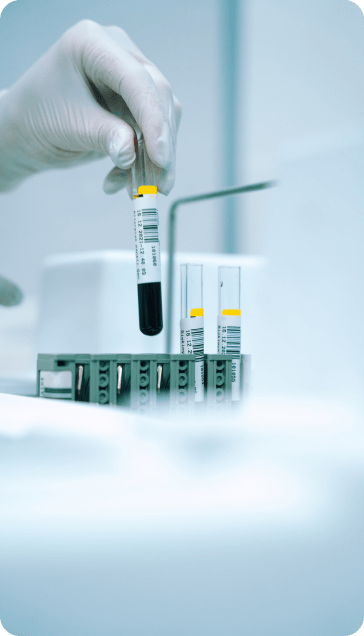
Al Borg Diagnostics
Fasting and Thyroid Health
Numerous studies have shown fasting benefits during Ramadan on the body, such as controlling diabetes, reducing blood pressure and cholesterol levels, and lowering the risk of heart disease. However, some individuals with chronic diseases may be concerned about the safety of fasting and ensuring disease management, like thyroid health and its disorder. This article will discuss this condition:(3)
Fasting and Thyroid Health
Preliminary studies indicate that fasting slightly reduces thyroid hormone levels. This can be explained by the body losing energy during long hours of fasting, leading to decreased thyroid hormone levels to lower metabolic activity and conserve energy.
However, this decrease is temporary, as hormone levels return to normal once fasting is broken and food is consumed.
Therefore, the relationship between fasting and thyroid health is not associated with negative effects. This hormonal fluctuation is the body’s response to preserve energy and strength during long fasting hours, and the body adjusts its levels once fasting is broken. (1)(2)
Fasting for Thyroid Patients
The information in the previous section about fasting and thyroid health may raise concerns among thyroid patients. However, experts and doctors state that individuals with thyroid diseases, whether hyperthyroidism or hypothyroidism, do not need to adjust their medication doses and can fast without any risks or effects. This medical decision is based on the following details: (4)
Fasting for Hypothyroidism Patients
Studies regarding fasting in individuals with hypothyroidism yielded the following findings: (4)(5)
- Limited studies showed decreased thyroid hormone levels to the lower end of the normal range. These hormones include triiodothyronine (T3), thyroxine (T4), and thyroid-stimulating hormone (TSH).
- Other studies indicated that the levels of T3 and TSH remained within the normal range while T4 levels decreased.
As a result of these potential changes, doctors and experts recommend taking hypothyroid medication 30 minutes to an hour before breaking the fast. This is because the absorption of the medication can be affected by food. Alternatively, patients can stop eating three hours before bedtime and take the medication before sleeping. Both methods have similar effects.(4)(5)
Please note that consulting with a healthcare professional or specialist regarding individual medical conditions and fasting practices is always advisable.
Fasting for Hyperthyroidism Patients
Studies have not reported any apparent effects of fasting on thyroid health in patients with hyperthyroidism, especially since hormone levels in the thyroid decrease during fasting hours.
Therefore, individuals with mild to moderate hyperthyroidism are expected to safely fast without any adverse effects or concerns. However, those with severe symptoms may be prone to dehydration, diarrhea, or irregular heartbeats, so consulting a doctor and seeking their advice before fasting is essential.
Managing medication during fasting is relatively easy for this condition, as most cases are treated with a long-acting drug called Methimazole, which can be taken at any time during the fasting hours in a single dose. Other treatment options, such as radioactive iodine and surgery, are postponed until after Ramadan. (4)
It is essential to emphasize the significance of consulting a doctor in all cases of thyroid disorders, regardless of their severity, and discussing the feasibility and safety of fasting while ensuring that medication adjustments are unnecessary.
Monitoring Thyroid Health During Fasting
In addition to the information provided earlier about fasting and thyroid health, medication adjustments, and important considerations, maintaining thyroid health can be further ensured by conducting tests for hormone levels in the blood. The following are details about these tests and analyses: (6)
- Thyroid-stimulating hormone (TSH) analysis: This is one of the primary tests doctors use to assess the balance of thyroid hormones. Low levels of TSH are associated with hyperthyroidism, while high levels indicate hypothyroidism.
- Triiodothyronine (T3) and thyroxine (T4) hormone analysis: These tests are used to diagnose and monitor the effectiveness of the treatment plan for both hypothyroidism and hyperthyroidism.
You can visit Al-Borg Diagnostics branches and undergo tests to detect thyroid health. Additionally, you can opt for a specialized package focused on thyroid health, including various examinations.
References:
- https://www.livofy.com/health/thyroid/intermittent-fasting-for-thyroid-science-of
- -thyroid-livofy/
- https://welltech.com/content/hypothyroidism-and-intermittent-fasting-is-it-a-good-idea/#can-diet-and-eating-habits-influence-thyroid-function
- https://www.clevelandclinicabudhabi.ae/en/health-byte/pages/how-ramadan-can-boost-your-health-and-wellbeing.aspx
- https://www.ncbi.nlm.nih.gov/pmc/articles/PMC3401749/#ref2
- https://www.wefast.care/articles/intermittent-fasting-and-hypothyroidism
Check your health with
Thyroid Care




